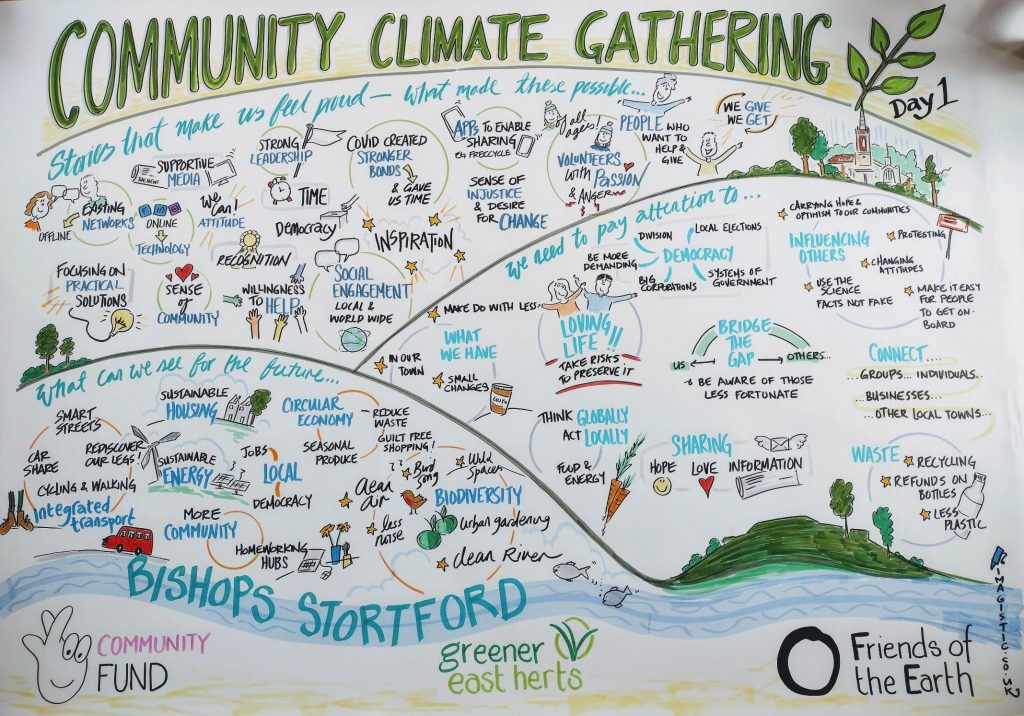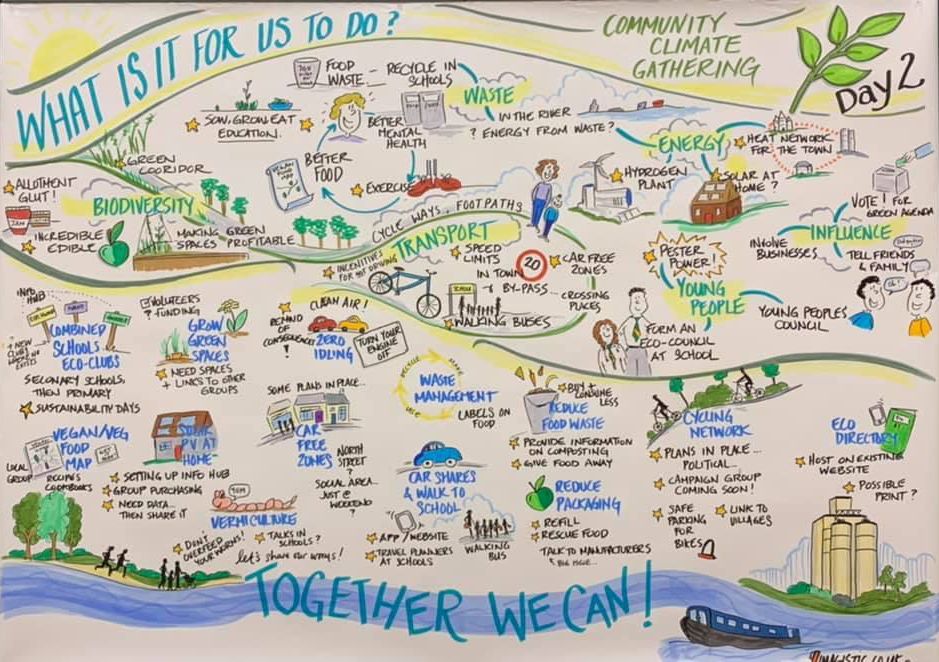The Community Climate Gathering was held at Birchwood High School on 6th and 7th November 2021.
More than 80 people from Bishop’s Stortford and the surrounding villages took part over the weekend to answer the question: what can we do together to fight climate change and to improve our environment?
The Gathering was organised by the Bishop’s Stortford Climate Group and was funded by the Community Fund of the National Lottery, the Friends of the Earth Climate Fund and East Herts District Council.
The outcomes from the Community Climate Gathering on 6th and 7th November 2021 were captured in two display whiteboards. Electronic versions of these images are available to download here:
Day 1: Where are we and where do we want to be?
We talked about:
- Things about our community that make us feel proud
- The future that we want to see in Bishop’s Stortford
- The things we need to pay attention to, to help us get there.
This graphic captures the heart of the conversations:

Day 2: What do we need to do?
We talked about the actions we are willing to take to move us towards the future we want.
To begin with we brainstormed all the actions that people in the group would like to see. Key themes that emerged were:
Energy
- At home: energy assessments, reducing demand, information sharing and advice about renewable energy
- At community level: crowdfunding community renewables, community heat networks, community energy group
- In new builds: press for higher standards, use our influence and (if needed) direct action
- A heat decarbonisation plan for the whole town
Biodiversity
- Green areas, wild spaces and green corridors
- Make more of the river as a green corridor
- Ensuring access for all
- Wilder gardens (= carbon sinks.)
- Cleaning up/ litter picking to protect biodiversity.
- Pocket parks
- Green roofs
Circular Economy
- Repair café
- Reuse options: Freecycle, Olio, charity shops etc.
- Community recycling facilities, central location in Jackson Square
Single Use Plastics
- Refill shop
- Making different choices
- ‘Single use plastic free’ town
- Takeaways to avoid single use plastics
Engaging Businesses
- Support for local businesses: buy local
- Transport plans for employees
- Vegan products
- Single use plastics
Community Food Growing
- Orchard
- Allotments
- Incredible Edibles: urban food growing in unused public spaces
- Education: teaching people to grow food and use it
- Links to food bank
Cycling
- Investment in routes and bike parking
- Repair and maintenance
- Campaigning
- Electric bike hire
Public Transport
- More flexible public transport
- More diverse / integrated public transport: trams, park and ride, better buses
- Encouraging people to use public transport
Safer streets for cycling and walking
- 20 mph zones
- Planning for people not cars
- Improve paths and share info about walking routes
- Anti-idling campaign for clean air
Cars
- Car-free spaces, streets, days
- Pedestrianisation
- Electric charging points
- Green hydrogen filling station
- Car sharing and lift sharing
- Shopping delivery service
Communications
- Engaging people who aren’t engaged
- Reaching new people in the community
- Sharing knowledge, info and resources
- Eco-directory and vegan food map
- Linking existing groups
- Active community campaigns/ storytelling
- Looking after ourselves/each other
Engaging Young People
- Encouraging active travel / public transport to schools
- Recycling in schools
- Less meat on the menu in schools
- Getting the message out to schools (assemblies)
- Sustainability trail through town
- Young Environmentalist Competition
- Encourage young people to get involved in local decision-making – Young People’s Council
- Youth projects: growing food, bee-keeping etc.
Supporting behaviour change: messages and campaigns
- Meat and healthy food
- Using our legs more, cars less
- Waste especially single use plastics
- Consumption
- Food waste
- You count
Engagement with local and national government
- Voting
- Lobbying
- Standing for election
- Protesting and direct action
- Demanding information and transparency
Funding and finance
- Community Finance Initiative to fund projects
- Funding for eco start-up businesses
Ways of working
- Learn from successes elsewhere.
- Think about how proposals will affect the poorest/most vulnerable in our community.
- Actions that don’t need politics to deliver are low-hanging fruit.
- Stick with it – don’t give up half way through.
- SMART objectives: specific, measurable, achievable, realistic, time-bound.
- Be respectful to others.
- Aspirational goals
- Ask those not on board: what are the barriers to change?
- Adopt a ‘can do/will do’ attitude
- Make small but permanent changes to work towards solutions
- Commit
- Re-establish the principles of transition towns
- Small changes done by all = big global difference
- ‘Rather than be defeated by the problem, be inspired by the creativity of the solutions
The key themes are included in this graphic.

In the final session of the day, small groups came together to select priority projects:
| Project title | What’s it all about |
| Cycling network | Calling for network of cycle paths & cycle parking, 20 mph zones, training, mass cycling events |
| Solar PV at home | Generating cost/benefit data and providing advice. Long term: group purchasing and community energy |
| Grow Green Spaces | Community growing food in public spaces that anyone can take |
| Waste Management | Making it easier for people to Reduce, Reuse, Recycle, Refill and Donate |
| Anti-idling campaign | To cut emissions and improve air quality |
| Composting food waste | Reducing food waste sent to landfill/incineration through home & community composting |
| Vegan Food Map | Helping people live a vegan lifestyle |
| Directory of Eco-Groups | Linking different groups in the community. A guide to who’s doing what. |
| Network of Eco-Clubs | Linking eco-clubs across all secondary schools in the town. Long term: involving primary schools too. |
These projects will be led by separate working groups and co-ordinated by the Bishop’s Stortford Climate Group.
Next steps: Here are four ways you can get involved in the work of the Bishop’s Stortford Climate Group:
- Join a project, please contact us
- Sign up for our newsletter. This will add you to our mailing list so we can send you our monthly news and email you about specific projects/events.
- Join the conversation on our public-facing Facebook page, or join our Facebook discussion group.
- Group members can also join Slack – an internal channel for communication around specific topics and workstreams. We’ll send you an invitation to this once we’ve made contact. During November we will be adding separate threads for each of the projects, to help group members connect.
- Come to our monthly meetings, held on the first Tuesday or Wednesday of each month. We are currently holding some meetings on-line and some face to face – check the website for details of the next meeting.
